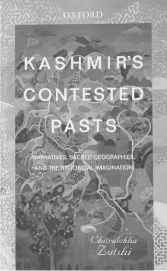I have always viewed Kashmir as a palimpsest on which there are several overlapping discourses, most of which have valid historical and theoretical contexts. Several academics and scholars are contemplating the study of the ancient and modern history of the Kashmir region as a discrete political and cultural entity, as well as its unique and crucial role in global and South Asian politics and culture. Chitralekha Zutshi’s book, Kashmir’s Contested Past, is one such commendable attempt to provide a layered understanding of Kashmir, undercutting, in the process, a unitary ideological and political position. I read this book as a postcolonialist trained to question the infallibility of an ‘objective’ opinion. Chitralekha Zutshi’s book defies the linearity and teleology of the grand historical narrative of Kashmir. Somewhere along the way the rich historical trajectory and multilingual narrative tradition of Kashmir have been relegated to the realm of oblivion by colonial, orientalist, and nationalist, some ultra Right-Wing, productions of history. The ugly scars of insurgency, counter-insurgency, mass exodus, displacement, dispossession, and despair have underscored brutal aspects of the history of Kashmir, while consigning aspects of the historical and sociocultural evolution of Kashmir, which did not conform either to colonial, statist, or insurgent agendas, to the catacombs of history. Chitralekha’s book is a study of historical narratives, textual, oral, and aural which construct plots that bear a wider national reference in precolonial as well as postcolonial Kashmir (mulk), from the sixteenth to the twentieth centuries. Such narratives were designed to enable the people of Kashmir to take charge of their social and political destinies. Storytellers, performers, folklorists, hagiographers, and historiographers were able to wield temporality and spatiality as powerful tools and challenge the imposition of history on them. In this process of national self-imagining, I would point out, allegory could be taught to re-create and preserve a jeopardized way of life. Post-Independence narrative is characterized in this work as well as in some others as the rewriting of history and the creation of the symbols of nationhood. The causal narrative in this kind of framework imparts resolvability to a disharmonious history. The effect of myth and folklore enabled, in the Kashmir context as in other postcolonial contexts, a metaphoric entry for popular culture into the plot, eroding colonial and orientalist histories. The Kashmiri storyteller, performer, historiographer employed the process of tropes and imaginative usage to create the postcolonial world. The array of neologisms and innovations that such writing and telling drew on the reconstructed normative form. This insertion of language variance incorporated and foregrounded cultural differences, challenging essentializing and universalizing readings of texts with respect to social and cultural forces.
October 2016, volume 40, No 10

